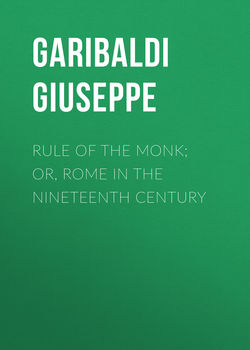Читать книгу Rule of the Monk; Or, Rome in the Nineteenth Century - Garibaldi Giuseppe - Страница 22
PART THE FIRST
CHAPTER XXI. THE TORTURE
ОглавлениеAs the hour of solemn vengeance had not yet struck, fright, and fright alone for the black-robed rulers of Rome was the result of the events we have detailed.
The priests were in mortal terror lest the thread by which the sword of popular wrath was suspended should be cut.
The hour, however, had not struck; the measure of the cup was not full; the God of justice delayed the day of his retribution.
Know you what the lust of priests is to torture? Do you know that by the priests Galileo was tortured? Galileo, the greatest of Italians! Who but priests could have committed him to the torture? Who but an archbishop could have condemned to death by starvation in a walled-up prison Ugolino and his four sons?
Where but in Rome have priests hated virtue and learning while they fostered ignorance and patronized vice? Woe to the man who, gifted by God above his fellows, has dared to exhibit his talent in Papal Italy. Has he not been immediately consigned to moral and physical tortures, until he admitted darkness was light?
Is it not surprising that in spite of the light of the nineteenth century, a people should be found willing to believe the blasphemous fables called the doctrines of the Church, and the priests permitted to hold or withhold salvation at their pleasure, and to exercise such power in such a continent, that rulers court their alliance as a means of enabling them the more effectually to keep, in subjection their miserable subjects?
In England, America, and Switzerland this torture has been abolished. There progress is not a mere word. In Rome the torture exists in all its power, though concealed. Light has yet to penetrate the secrets of those dens of infamy called cloisters, seminaries, convents, where beings, male and female, are immured as long as life lasts, and are bound by terrible vows to resign forever the ties of natural affection and sacred friendship.
Fearful are the punishments inflicted upon any hapless member suspected of being lax in his belief, or desirous of being released from his oaths. Redress for them is impossible in a country where despotism is absolute, and the liberty of the press chained.
Yes, in Rome, where sits the Vicar of God, the representative of Christ, the man of peace, the torture, I say, still exists as in the times of Saint Dominic and Torquemada. The cord and the pincers are in constant requisition in these present days of political convulsion.
Poor Dentato, the sergeant of dragoons who facilitated the escape of Manlio, soon experienced this. He had been unfortunately identified as engaged at the Quirinal Morning, noon, and night means too horrible to divulge were resorted to to compel him to give up the names of those concerned in the attack upon the prison. Failing to gain their point, he had been left by his tormentors a shapeless mass, imploring his persecutors to show mercy by putting him to death.
Unhappy man! the executioners falsely declared he had denounced his accomplices, and continued daily to make fresh arrests.
Yet the world still tolerates these fiends in human form, and kings moreover impose them upon our unhappy countries. God grant the people of Italy will before long have the will and the courage to break this hateful yoke from off their necks! God set us free, before we are weary of praying, from those who take His holy name in vain, and chase Christ himself out of the Temple to set their money-changing stalls therein!
